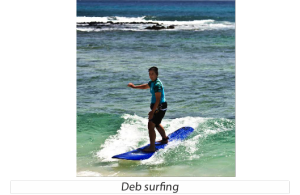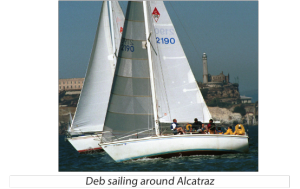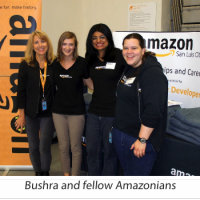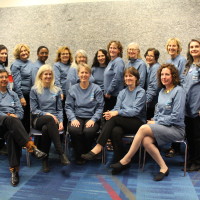Interview with Deb Agarwal
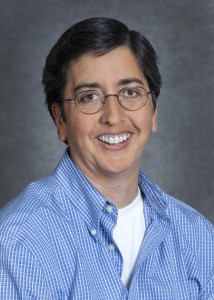 Deborah Agarwal is a Senior Scientist and the Data Science and Technology Department Head at Lawrence Berkeley National Laboratory (LBNL, http://dst.lbl.gov). Dr. Agarwal’s current research focuses on developing computational tools to enable scientists to more effectively organize and use their data to understand and mitigate climate change. She has worked on projects involving watershed understanding, tropical forests, soil carbon, carbon capture, cosmology, particle accelerators, and satellite data. Dr. Agarwal earned her BS in Mechanical Engineering from Purdue University. Her MS and PhD are from the University of California, Santa Barbara in Computer Engineering. Dr. Agarwal’s career has taken her around the world; in addition to consulting at the United Nations in Vienna, she has traveled to India, Japan, and Taiwan, and spent a year working in Rennes, France, on sabbatical at Inria as an International Chair. Dr. Agarwal is committed to increasing diversity in computing, and is involved in organizing mentoring programs to help underrepresented groups succeed. Her hobbies include photography, travel, sailboat racing, kayaking, swimming, crossword puzzles, and gardening.
Deborah Agarwal is a Senior Scientist and the Data Science and Technology Department Head at Lawrence Berkeley National Laboratory (LBNL, http://dst.lbl.gov). Dr. Agarwal’s current research focuses on developing computational tools to enable scientists to more effectively organize and use their data to understand and mitigate climate change. She has worked on projects involving watershed understanding, tropical forests, soil carbon, carbon capture, cosmology, particle accelerators, and satellite data. Dr. Agarwal earned her BS in Mechanical Engineering from Purdue University. Her MS and PhD are from the University of California, Santa Barbara in Computer Engineering. Dr. Agarwal’s career has taken her around the world; in addition to consulting at the United Nations in Vienna, she has traveled to India, Japan, and Taiwan, and spent a year working in Rennes, France, on sabbatical at Inria as an International Chair. Dr. Agarwal is committed to increasing diversity in computing, and is involved in organizing mentoring programs to help underrepresented groups succeed. Her hobbies include photography, travel, sailboat racing, kayaking, swimming, crossword puzzles, and gardening.
Q: In your current position at Lawrence Berkeley National Lab, what are your goals and the opportunities to make an impact? What attracted you to this position? As a researcher at the lab, I have the opportunity to get involved in solving computing related challenges in a wide array of science disciplines. Currently, I work mostly with environmental scientists. My interest in the position came from the opportunity to work on both computer science research and with top scientists in other disciplines. My goal, and favorite part of working at the lab, is the chance to help understand climate change, find alternative energy sources, and understand dark energy, among other challenges. The opportunity to work on these challenges is what attracted me to the position, which I find incredibly fulfilling.
Q: What has been your path that brought you to this point in your career? I was originally a mechanical engineer, and worked after my undergrad as a mechanical engineer at General Motors. I loved mechanical engineering, but when I returned to graduate school I found that I enjoyed computing even more. Then, I transferred to computer engineering and completed my master’s and PhD. At that time, my intention was to become an academic. I also interviewed with the Berkeley Lab, and I received offers from the lab and academia. It made sense to start my career at the lab since it would allow me to begin my research career, without being required to also teach classes. I also liked the idea of helping scientists solve challenges. My plan was to work at Berkeley Lab for about three years and then move to academia, and I ended up loving it so much that I stayed. Another aspect of my path has been the opportunity to take on management responsibilities. I now split my time between engaging directly in research, and helping researchers in our department to succeed in their research engagements and careers.
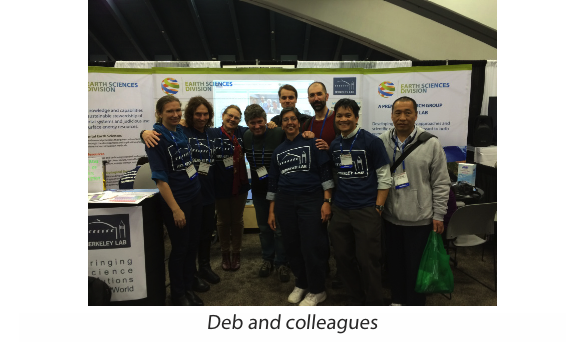
Q: Explain a bit about your current research. I work on four environmental science projects focusing on data management, synthesis, and analysis. The AmeriFlux project supports scientific teams at sites across the Americas studying carbon exchange between the atmosphere and the local biome. The NGEE Tropics project will improve the accuracy of climate models in the tropics, the Genomes to Watersheds project is developing an understanding of nutrient cycles in watersheds, and the Fukushima Environmental Monitoring project is working to understand the current and projected effects of contamination. In each of these projects, we are improving our understanding of the drivers and dynamics of climate change.
We work in tight collaboration with the domain scientists, and immerse ourselves in the science in order to understand the problem well enough to help. The AmeriFlux project is a good example: we are performing QA/QC on the data, building the data processing pipeline, and developing the data standards for reporting the data. We also are supporting the users of the data and adding products to help improve the usability of the data. We build enough proficiency to be able to understand the algorithms, trade-offs, needs, and vocabulary of the science domain. This approach allows our work with the domain to be a team effort, rather than a hand-off arrangement. In our experience, working with scientists in a hand-off fashion never works. You need to continually work together or it is too easy to misunderstand a problem.
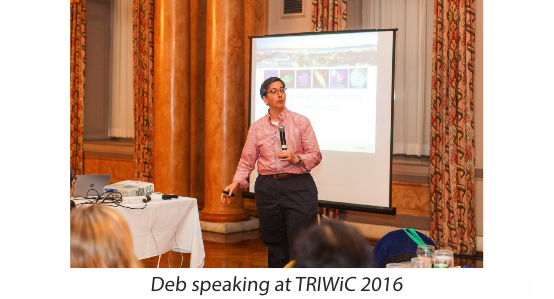
Q: How has your research evolved over time? My first research project was developing a remote experiments capability for our particle accelerator beamlines. Several research projects emerged from that initial one, including developing telepresence technologies, advanced networking capabilities, and even an award-winning telepresence robot. Since then, I have worked on a wide array of science projects; these include development of a satellite concept to study supernovae, enabling carbon capture technology, understanding how biomes exchange carbon with the atmosphere, and developing watershed understanding.
Our approach to working on science projects has changed significantly over time. When I first joined the lab, our research projects were designed to address an existing or future identified science challenge, and typically led to significant computer science research results. However, they often had minimal impact on the science. Now we partner closely with a science project team, and focus on achieving the science goals. This means we are signing up not just to do the cool algorithm, but to work on the whole data processing pipeline. This approach has led to strong long-lasting partnerships with scientists that have a significant impact on the science. An unexpected result of this deeper partnership with science projects has been the increased vitality of our computing research program.
Working at the lab there are often serendipitous opportunities to do really amazing things. I spent a few years working on and off with the Comprehensive Test-Ban Treaty Organization (CTBTO) at the United Nations in Vienna. Also, I helped put together equipment sent to the South Pole when a doctor researching there was diagnosed with cancer. During my career I have met five of the thirteen Nobel Prize winners at the lab and I have a periodic table signed by Glenn Seaborg, discoverer of the element Seaborgium (106).
Q: What are the most exciting future opportunities and research challenges in your area? The research challenges that excite me the most include dealing with diverse distributed data sources, enabling multi-scale understanding, and model/data integration. These are areas that have not received the computer science research focus required. Scientists are facing these challenges in every field, including biology, chemistry, physics, cosmology, energy, and environmental science. In many cases their ability to make the next science advances can be dramatically improved through better computer science technology. Much of this technology requires significant research in fields like data management, machine learning, distributed systems, and many others.
Q: What do you enjoy most about your career right now? What drives you at this point in your career? I love the opportunity to continually redefine who I am and what I am working on. My career goal has always been to work with good people and have a real impact. At the lab I have had the opportunity to work with top scientists, including two Nobel Prize winners, and work on important challenges. As a manager, I am able to expand my impact beyond my own research by helping to guide and shape the careers of our diverse team.
Q: What challenges have you had to overcome as a woman leader in the field? What is the most difficult aspect of your career right now? As a leader I face many challenges, but few have to do with being a woman. My strategy is to work for good people who value their people and treat them with respect. Once I learned to look for that quality in the chain of command above me, any issues I had disappeared. I have had many incredible bosses during my career. Life is too short to work for a bad boss. I tend to hire people who are highly qualified, bring diverse perspectives, and will mesh with the rest of the team.
The main challenge I face is funding. We are soft funded (proposal-based) and maintaining funding is a continual challenge. We have solved that through deeper science partnerships. We adopted a version of a user-centered design approach for building our partnerships; the scientists we work with love it, and we have had little difficulty finding projects to work on.
Q: What accomplishments are you most proud of? A major accomplishment was recovering from the retirement of our program manager. Since all our funding was from her, we were about to drop from having around $5 million in research funds to zero funding. I really thought that we were going to have to shut down the department and all get other jobs. We sat down together as a department and decided a strategy for recovery, then executed it. This is when we switched to working more deeply with the science teams. We are now larger than we were and continue to grow. In the process, we have diversified our funding sources to no longer have a single point of failure and have built an incredible team of people.
Q: How have you been involved in CRA-W? What has this involvement meant to you? After joining the board, my first assignment was to co-lead the Mid-Career Mentoring Workshops, lab and industry track. I have since also added the Early-Career Mentoring Workshop, lab and industry track to my responsibilities. I am also now a member of the Steering Committee, and was a speaker and mentor at Grad Cohort in 2015, for the first time. This year, I plan to help out at Grad Cohort again and serve as a distinguished lecturer at another event in Cincinnati. I really love participating in these events, and helping other women gain knowledge on how to succeed and have fun in their career.
Q: In what other activities that support women in computing have you been involved? I have been attending the Grace Hopper Conferences periodically since they began in 1994. I have given talks and been on panels at recent conferences. I also co-organized the Data Science track at last year’s conference. In addition, I have given talks at high schools, and addressed women in computer science councils at Bay Area universities. I am a mentor and run a leadership seminar for the TechWomen program, sponsored by the State Department. I was also a co-mentor for a high school girls’ team for Technovation. Within the lab I lead our CS Diversity Working Group, which sponsors a mentoring program for under-represented student interns and other related activities.
Q: How do you balance work and family life? What do you enjoy doing when you aren’t working? The best way for me to balance work and family time is to not mix the two. I carpool with another person to the lab so I do not stay late at work; when I am home, my wife and I spend some dedicated time together before I deal with any remaining work. I love to travel and am currently doing a sabbatical with Inria in Rennes, France. The sabbatical is a total of 12 months’ time over five years, so my wife and I spend about three months a year in France. The sabbatical enables us to immerse ourselves in the culture and travel around France and Europe. It also allows me to see how research and funding is handled in France. One of the really fun things I experienced last time I was in France was to attend a professional handball game. In terms of hobbies, I love to do the New York Times Crossword, photography, jigsaw puzzles, bicycling, boating, and hiking. Our latest passion has been night photography.
Q: Do you have any advice for women at any stage of their careers?
Some of the key pieces of advice that have served me well:
- Do a good job on every project you undertake. If you are not going to do a good job, don’t take it on.
- Share credit and authorship generously.
- Celebrate the achievements of others around you.
- Don’t make enemies. Anyone might become your next boss. Our field is quite small and there are significantly less than six degrees of separation.
- Learn good communication skills (written, oral, and body language).
- Don’t be in a hurry to become a success. Concentrate instead on having fun and doing well at what is in front of you and success will come.
- Learn to lead without power. The skills you develop will serve you well when you have power.
- Study people who have careers that you would like, and try to learn how they think about their career and what they have done to build their career.
- Build work-life balance into your career. A question I ask myself when making trade-offs is “Which thing will I regret missing more?”
- Take advantages of serendipitous opportunities when they come to you.

